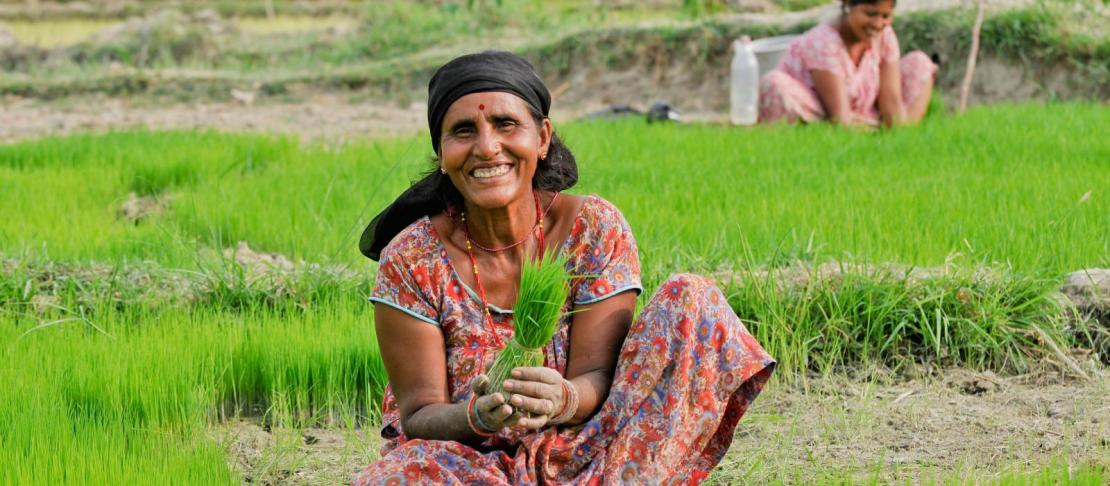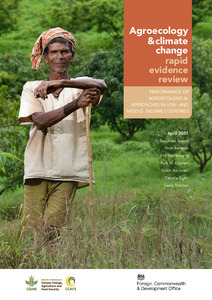- the UK—as part of its COP26 Presidency—engaged a new campaign ‘Transforming Agricultural Innovation for People, Nature and Climate’ to catalyse a step change in agricultural innovation.
- This component of the COP26 Nature Campaign is co-chaired by the UK Foreign, Commonwealth & Development Office (FCDO) and the CGIAR Research Program on Climate Change, Agriculture and Food Security (CCAFS).
- This session is part of a Transforming agricultural innovation - webinar series of 5 webinars
Building evidence for transforming agricultural innovation systems under climate change
The second in a series of webinars to set a path for transformation in agricultural innovation systems, in the lead up to COP26. Agroecology is increasingly promoted as a means to transform food systems globally, yet the evidence for generating large-scale impacts on climate change adaptation and mitigation in developing countries has been unclear.- This session summarized the quality and strength of evidence regarding (i) the impact of agroecological approaches on climate change mitigation and adaptation in low-and-middle-income countries, and (ii) the programming approaches and conditions supporting large-scale agroecological transitions.
- The session included panelists from notable, large-scale initiatives for agroecology and invites them to comment on the review findings and their experience about what is necessary to scale up agroecology programs.
The review also identified knowledge gaps critical to understand and inform future public and private investment in research, development and deployment of agroecological approaches.
- Lini Wollenberg, Flagship Leader for Low Emissions Development, CGIAR Research Program on Climate Change, Agriculture and Food Security (CCAFS) and University of Vermont (UVM) - Moderator
- Yodit Kebede, Post-doctoral Researcher, the French National Research Institute for Sustainable Development (IRD) - Introduction to the evidence review webinars & Welcome by Chair
- Sieg Snapp, Professor, Michigan State University (MSU) - Climate change and the performance of agroecological approaches in low- and middle-income countries
- Vijay Kumar Thallam, Advisor and Co-Vice Chariman, Zero Budget Natural Farming (ZBNF) & Andhra Pradesh Community Managed Natural Farming (APCNF)
- Batamaka Somé, International Consultant for The McKnight Foundation's Collaborative Crop Research Programme activities for West Africa
- Sandra Gagnon, PhD, Senior Program Officer for Climate-Resilient Food Systems, International Development Research Centre (IDRC)
- Guy Faure, Senior Policy Officer, European Commission
- Liz Kirk, Senior Food Security and Commercial Agriculture Adviser, UK Foreign, Commonwealth & Development Office (FCDO) - Closing and introduction to next webinar
Resource:
Snapp S, Kebede Y, Wollenberg E, Dittmer KM, Brickman S, Egler C, Shelton S. 2021. Agroecology and climate change rapid evidence review: Performance of agroecological approaches in low- and middle- income countries. Wageningen, the Netherlands: CGIAR Research Program on Climate Change,
Agriculture and Food Security (CCAFS) 64 pp.
To assess evidence related to agroecology‘s climate change outcomes we conducted a systematic literature review of i) synthesis papers and ii) primary empirical studies related to nutrient and pest and disease management. For the latter we documented the presence of evidence for climate change outcome indicators, but not the magnitude or direction of the change. We also conducted semi-structured interviews with representatives from 12 organizations supporting or implementing on-the-ground agricultural development programmes to better understand the feasibility of scaling out agroecology.



In this great review report, I was re-assured by the global evidence which listed 4 main enabling conditions for scaling agroecology (p25): digital tools, especially video, was one; the other farmer-to-farmer knowledge-sharing and co-learning. Both of these are at the core of what we do at Access Agriculture.
ReplyDelete